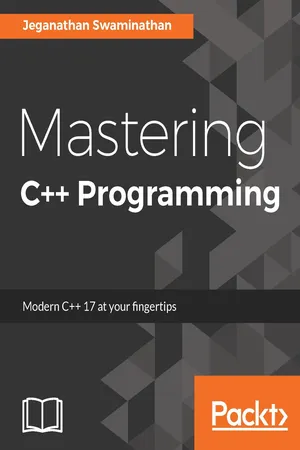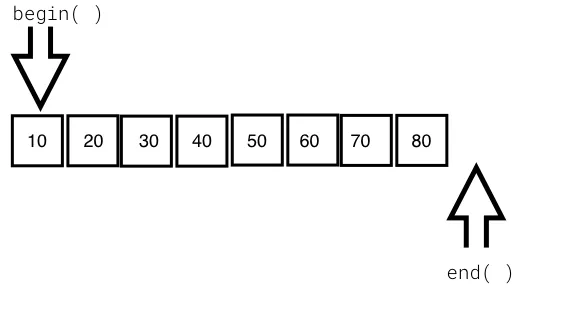
- 384 pages
- English
- ePUB (mobile friendly)
- Available on iOS & Android
Mastering C++ Programming
About this book
Take your C++ coding to the next level by leveraging the latest features and advanced techniques to building high performing, reliable applications. About This Book• Get acquainted with the latest features in C++ 17• Take advantage of the myriad of features and possibilities that C++ offers to build real-world applications• Write clear and expressive code in C++, and get insights into how to keep your code error-freeWho This Book Is ForThis book is for experienced C++ developers. If you are a novice C++ developer, then it's highly recommended that you get a solid understanding of the C++ language before reading this book What You Will Learn• Write modular C++ applications in terms of the existing and newly introduced features• Identify code-smells, clean up, and refactor legacy C++ applications• Leverage the possibilities provided by Cucumber and Google Test/Mock to automate test cases• Test frameworks with C++• Get acquainted with the new C++17 features• Develop GUI applications in C++• Build portable cross-platform applications using standard C++ features In DetailC++ has come a long way and has now been adopted in several contexts. Its key strengths are its software infrastructure and resource-constrained applications. The C++ 17 release will change the way developers write code, and this book will help you master your developing skills with C++. With real-world, practical examples explaining each concept, the book will begin by introducing you to the latest features in C++ 17. It encourages clean code practices in C++ in general, and demonstrates the GUI app-development options in C++. You'll get tips on avoiding memory leaks using smart-pointers. Next, you'll see how multi-threaded programming can help you achieve concurrency in your applications. Moving on, you'll get an in-depth understanding of the C++ Standard Template Library. We show you the concepts of implementing TDD and BDD in your C++ programs, and explore template-based generic programming, giving you the expertise to build powerful applications. Finally, we'll round up with debugging techniques and best practices.By the end of the book, you'll have an in-depth understanding of the language and its various facets. Style and approachThis straightforward guide will help you level up your skills in C++ programming, be it for enterprise software or for low-latency applications like games. Filled with real-world, practical examples, this book will take you gradually up the steep learning curve that is C++.
Tools to learn more effectively

Saving Books

Keyword Search

Annotating Text

Listen to it instead
Information
Standard Template Library
- STL overview
- STL architecture
- Containers
- Iterators
- Algorithms
- Functors
- STL containers
- Sequence
- Associative
- Unordered
- Adaptors
The Standard Template Library architecture
- Algorithms
- Functors
- Iterators
- Containers
Algorithms
Iterators
Gang of Four published their design patterns-related work to the software community. Iterators themselves are objects that allow traversing the containers to access, modify, and manipulate the data stored in the containers. Iterators do this so magically that we don't realize or need to know where and how the data is stored and retrieved.

- Input iterators
- Output iterators
- Forward iterators
- Bidirectional iterators
- Random-access iterators
| The type of iterator | Description |
| Input iterator |
|
| Output iterator |
|
| Forward iterator |
|
Table of contents
- Title Page
- Copyright
- Credits
- About the Author
- About the Reviewer
- www.PacktPub.com
- Customer Feedback
- Dedication
- Preface
- C++17 Features
- Standard Template Library
- Template Programming
- Smart Pointers
- Developing GUI Applications in C++
- Multithreaded Programming and Inter-Process Communication
- Test-Driven Development
- Behavior-Driven Development
- Debugging Techniques
- Code Smells and Clean Code Practices
Frequently asked questions
- Essential is ideal for learners and professionals who enjoy exploring a wide range of subjects. Access the Essential Library with 800,000+ trusted titles and best-sellers across business, personal growth, and the humanities. Includes unlimited reading time and Standard Read Aloud voice.
- Complete: Perfect for advanced learners and researchers needing full, unrestricted access. Unlock 1.4M+ books across hundreds of subjects, including academic and specialized titles. The Complete Plan also includes advanced features like Premium Read Aloud and Research Assistant.
Please note we cannot support devices running on iOS 13 and Android 7 or earlier. Learn more about using the app